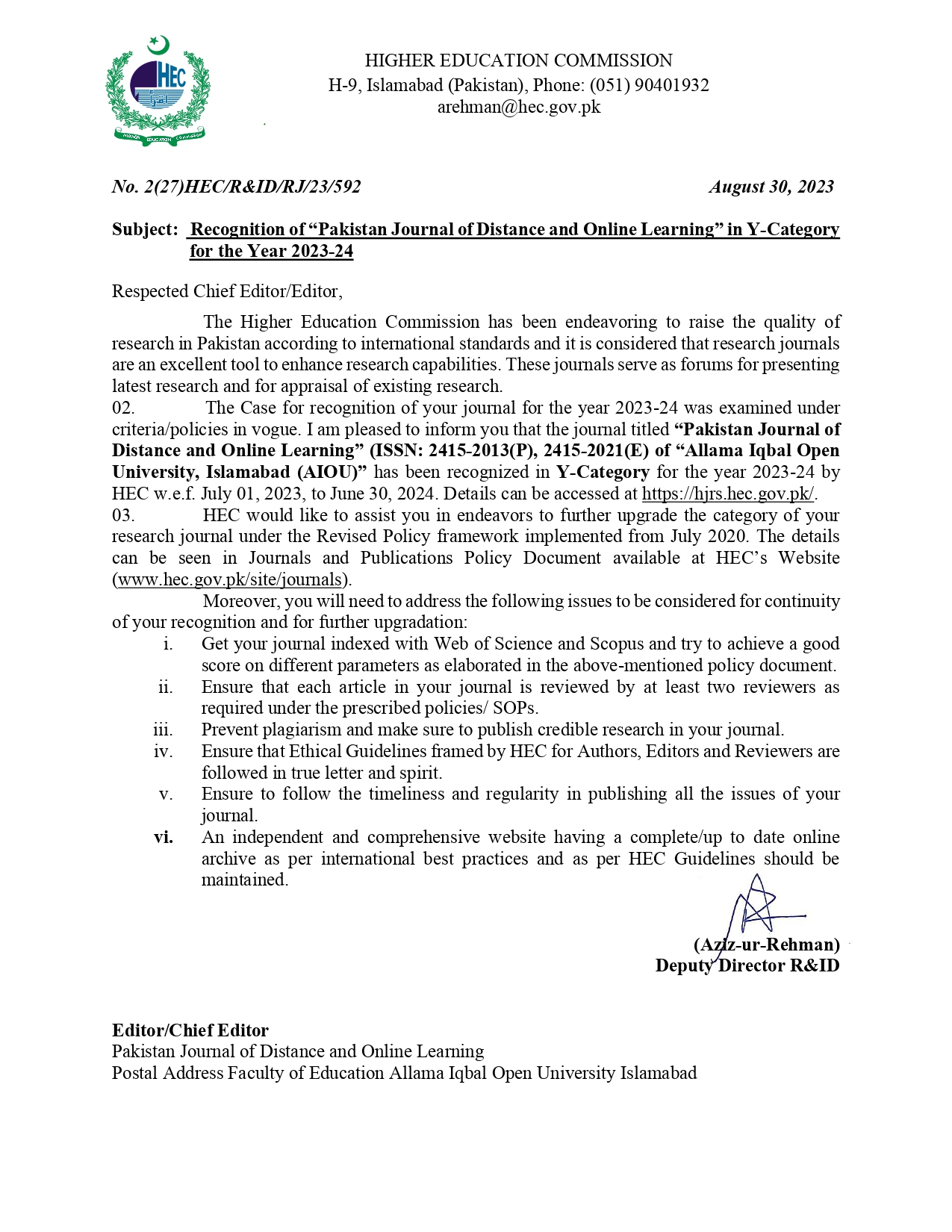Perception of Eswatini Teachers about Effectiveness of online course “Certificate in Online Teaching for Educators”
DOI:
https://doi.org/10.30971/pjdol.v10i1.1763Keywords:
teaching practices, short course in online teaching, impact study, eswatini, educatorsAbstract
This study evaluated the impact of a 6-week fully online Certificate in Online Teaching for Educators (COTE) program on graduates' teaching practices. A survey was distributed to 350 COTE graduates, with 24 respondents completing the questionnaire. Results showed that most participants applied learnings from COTE to their teaching including designing online lessons, creating multimedia resources, facilitating virtual classes, using new educational technologies, implementing authentic assessments and providing meaningful feedback. Over 70% of respondents felt more confident facilitating online learning, better able to engage students virtually, and expanded their knowledge of online pedagogy after completing COTE. The findings suggest that despite its short duration, COTE positively influenced graduates' preparedness and skills in key areas of online instruction. However, the low response rate limits generalizability. Further research with larger samples is needed to corroborate the impact of COTE on online teaching practices.
Downloads
References
Đenić, S., Petrovic, V., & Štrbac-Savić, S. (2022). Vocational teacher training in online course design and tutoring: Motivating teachers to participate in the e-training. Proceedings TIE 2022. https://doi.org/10.46793/tie22.341q. DOI: https://doi.org/10.46793/TIE22.341Q
Ferreira-Meyers, K. (2023). Importance of measuring student experience in a short online course for educators. Advances in Online Education: A Peer-Reviewed Journal, 2(1), 71-81. DOI: https://doi.org/10.69554/JNAP4551
Galikhanov, M.F., & Khasanova, G.F. (2019). Faculty training for online teaching: roles, competences, contents. Vysshee Abrazovanie V Rossie. Higher Education in Russia, 28(2), 51-62. DOI: 10.3199210869-3617.2019-28-2-51-62. DOI: https://doi.org/10.31992/0869-3617-2019-28-2-51-62
Haarala-Muhonen, A., Myyry, L., Pyörälä, E., Kallunki, V., Anttila, H., Katajavuori, N., Kinnunen, P., & Tuononen, T. (2023). The impact of pedagogical and ICT training in teachers’ approaches to online teaching and use of digital tools. Frontiers in Education. https://doi.org/10.3389/feduc.2023.1223665. DOI: https://doi.org/10.3389/feduc.2023.1223665
Joshi, D., Adhikari, K., Chapai, K., & Bhattarai, A. (2023). Effectiveness of online training on digital pedagogical skills of remote area teachers in Nepal. International Journal of Professional Development, Learners and Learning. https://doi.org/10.30935/ijpdll/13666. DOI: https://doi.org/10.30935/ijpdll/13666
Kirkpatrick, J. D., & Kirkpatrick, W. K. (2016). Kirkpatrick's four levels of training evaluation VA: Association for Talent Development.
Leoste, J., Lavicza, Z., Fenyvesi, K., Tuul, M., & Õun, T. (2022). Enhancing digital skills of early childhood teachers through online science, technology, engineering, art, math training programs in Estonia., 7. https://doi.org/10.3389/feduc.2022.894142. DOI: https://doi.org/10.3389/feduc.2022.894142
Li, Y., Nishimura, N., Yagami, H., & Park, H. (2021). An empirical study on online learners’ continuance intentions in China. Sustainability, 13, 889. DOI: https://doi.org/10.3390/su13020889
Marrero, M.E., Woodruff, K.A., Schuster, G.S., & Riccio, J.F. (2010). Live, online short-courses: A case study of innovative teacher professional development. The International Review of Research in Open and Distributed Learning, 11, 81-95. DOI: https://doi.org/10.19173/irrodl.v11i1.758
McKimm, J., & Jones, P. (2017). Twelve tips for applying change models to curriculum design, development and delivery. Medical Teacher, 40, 520-526. DOI: https://doi.org/10.1080/0142159X.2017.1391377
Navarro, J., & McGrath, B. (2022). Strategies for effective online teaching and learning. Handbook of Research on Future of Work and Education. https://doi.org/10.4018/978-1-7998-8275-6.ch029. DOI: https://doi.org/10.4018/978-1-7998-8275-6.ch029
Ohvanainen, J., & Hakala, E. (2014). Introducing a change path framework for an industrial Company entering service business. International Journal of Service Science, Management, and Engineering, 1(2), 21..
Sieber, J.E. (2005). Misconceptions and realities about teaching online. Science and Engineering Ethics, 11, 329-340. DOI: https://doi.org/10.1007/s11948-005-0002-7
Smolander, K., Larsen, E. Å., & Päivärinta, T. (2011). Explaining change paths of systems and software development practices. In Information Systems Development: Asian Experiences (pp. 399-410). Springer New York. DOI: https://doi.org/10.1007/978-1-4419-7355-9_34
Vilppu, H., Södervik, I., Postareff, L., & Murtonen, M. (2019). The effect of short online pedagogical training on university teachers’ interpretations of teaching–learning situations. Instructional Science, 47, 679-709. DOI: https://doi.org/10.1007/s11251-019-09496-z
Yelne, D. (2022). Impact of online education and its effective practice. International Journal of Scientific Research in Engineering and Management, 6(5), 1-9. https://doi.org/10.55041/ijsrem12858. DOI: https://doi.org/10.55041/IJSREM12858
Downloads
Published
How to Cite
Issue
Section
License
Authors may photocopy and use their articles without any permission/fee for noncommercial purposes as specified by the Creative Commons Attribution-NonCommercial 4.0 International License. For using work for commercial purpose, please contact on editor.pjdol@aiou.edu.pk .









